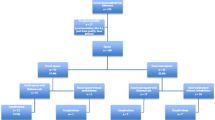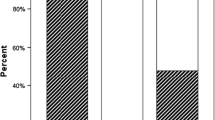Abstract
Purpose
This study examined the success and factors associated with failure, of using cement spacers impregnated with high-dose Ceftazidime and Vancomycin when performing two-stage revision for infected total knee arthroplasty (TKA).
Methods
A retrospective analysis was performed using a prospectively collected database of 82 patients (median age 68 years, range 39–87) with a confirmed deep TKA infection treated with a two-stage revision. All cement spacers were impregnated with high-dose Ceftazidime and Vancomycin. The rate of success was recorded—an association between failure of treatment, and patient factors, previous surgical treatment, and microbial characteristics was sought.
Results
The mean time to infection from index arthroplasty was 45 months (range 3–240). The initial two-stage revision was successful in 70/82 patients (85.4 %), who remained free of infection at average follow-up of 36.2 months (range 24–85). A second two-stage revision for infection was required in 12/82 patients (14.6 %), which was successful in 4/12 (33 %). A third two-stage revision was performed in three patients, all of whom had a polymicrobial infection of which only one patient had successful eradication of infection. Recurrent infection was correlated with irrigation and debridement with implant retention prior to initial two-stage revision (p < 0.01), polymicrobial infections (p = 0.035), and infections presenting <6 months after index surgery (p = 0.031). No correlation was seen with age, BMI, type of organism, diabetes mellitus, or Charlson Comorbidity Index.
Conclusion
The findings of this study suggest that the combination of Ceftazidime and Vancomycin in cement spacers is as efficacious as other published single or combined antibiotic mixtures, which is clinically relevant to clinicians treating this difficult problem in the setting of patients with compromised renal function.

Similar content being viewed by others
References
Azzam K, McHale K, Austin M, Purtill JJ, Parvizi J (2009) Outcome of a second two-stage reimplantation for periprosthetic knee infection. Clin Orthop Relat Res 467:1706–1714
Bradbury T, Fehring TK, Taunton M, Hanssen A, Azzam K, Parvizi J, Odum SM (2009) The fate of acute methicillin-resistant Staphylococcus aureus periprosthetic knee infections treated by open debridement and retention of components. J Arthroplasty 24:101–104
Brandt CM, Sistrunk WW, Duffy MC, Hanssen AD, Steckelberg JM, Ilstrup DM, Osmon DR (1997) Staphylococcus aureus prosthetic joint infection treated with debridement and prosthesis retention. Clin Infect Dis 24:914–919
Buchholz HW, Engelbrecht H (1970) Depot effects of various antibiotics mixed with Palacos resins. Chirurg 41:511–515
Cha MS, Cho SH, Kim DH, Yoon HK, Cho HS, Lee DY, Lee SH, Hwang SC (2015) Two-stage total knee arthroplasty for prosthetic joint infection. Knee Surg Relat Res. 27(2):82–89
Charlson ME, Pompei P, Ales KL, MacKenzie CR (1987) A new method of classifying prognostic comorbidity in longitudinal studies: development and validation. J Chronic Dis 40:373–383
Coventry MB (1975) Treatment of infections occurring in total hip surgery. Orthop Clin North Am 6:991–1003
Curtis JM, Sternhagen V, Batts D (2005) Acute renal failure after placement of tobramycin-impregnated bone cement in an infected total knee arthroplasty. Pharmacotherapy 25(6):876–880
Dovas S, Liakopoulos V, Papatheodorou L, Chronopoulou I, Papavasiliou V, Atmatzidis E, Giannopoulou M, Eleftheriadis T, Simopoulou T, Karachalios T, Stefanidis I (2008) Acute renal failure after antibiotic-impregnated bone cement treatment of an infected total knee arthroplasty. Clin Nephrol 69(3):207–212
Fink B, Makowiak C, Fuerst M, Berger I, Schäfer P, Frommelt L (2008) The value of synovial biopsy, joint aspiration and C-reactive protein in the diagnosis of late peri-prosthetic infection of total knee replacements. J Bone Joint Surg Br 90(7):874–878
Haleem AA, Berry DJ, Hanssen AD (2004) Mid-term to long-term followup of two-stage reimplantation for infected total knee arthroplasty. Clin Orthop Relat Res 428:35–39
Hebert CK, Williams RE, Levy RS, Barrack RL (1996) Cost of treating an infected total knee replacement. Clin Orthop Relat Res 331:140–145
Hendriks JG, van Horn JR, van der Mei HC, Busscher HJ (2004) Backgrounds of antibiotic-loaded bone cement and prosthesis-related infection. Biomaterials 25(3):545–556
Jamsen E, Huhtala H, Puolakka T, Moilanen T (2009) Risk factors for infection after knee arthroplasty. A register-based analysis of 43,149 cases. J Bone Joint Surg Am 91:38–47
Jiranek WA, Hanssen AD, Greenwald AS (2006) Antibiotic-loaded bone cement for infection prophylaxis in total joint replacement. J Bone Joint Surg Am 88:2487–2500
Joseph TN, Chen AL, Di Cesare PE (2003) Use of antibiotic impregnated cement in total joint arthroplasty. J Am Acad Orthop Surg 11(1):38–47
Kalra KP, Lin KK, Bozic KJ, Ries MD (2010) Repeat 2-stage revision for recurrent infection of total hip arthroplasty. J Arthroplasty 25:880–884
Kilgus DJ, Howe DJ, Strang A (2002) Results of periprosthetic hip and knee infections caused by resistant bacteria. Clin Orthop Relat Res 404:116–124
Lindeque B, Hartman Z, Noshchenko A, Cruse M (2014) Infection after primary total hip arthroplasty. Orthopedics 37(4):257–265
Mahmud T, Lyons MC, Naudie DD, Macdonald SJ, McCalden RW (2012) Assessing the gold standard: a review of 253 two-stage revisions for infected TKA. Clin Orthop Relat Res 470:2730–2736
Menge TJ, Koethe JR, Jenkins CA, Wright PW, Shinar AA, Miller GG, Holt GE (2012) Acute kidney injury after placement of an antibiotic-impregnated cement spacer during revision total knee arthroplasty. J Arthroplasty 27(6):1221–1227
Mirra JM, Amstutz HC, Matos M, Gold R (1976) The pathology of the joint tissues and its clinical relevance in prosthesis failure. Clin Orthop Relat Res 117:221–240
Mortazavi SM, Vegari D, Ho A, Zmistowski B, Parvizi J (2011) Two-stage exchange arthroplasty for infected total knee arthroplasty: predictors of failure. Clin Orthop Relat Res 469(11):3049–3054
Parvizi J, Adeli B, Zmistowski B, Restrepo C, Greenwald AS (2012) Management of periprosthetic joint infection: the current knowledge: AAOS exhibit selection. J Bone Joint Surg Am 94:e104
Parvizi J, Saleh KJ, Ragland PS, Pour AE, Mont MA (2008) Efficacy of antibiotic-impregnated cement in total hip replacement. Acta Orthop 79(3):335–341
Patrick BN, Rivey MP, Allington DR (2006) Acute renal failure associated with vancomycin- and tobramycin-laden cement in total hip arthroplasty. Ann Pharmacother 40(11):2037–2042
Pelt CE, Grijalva R, Anderson L, Anderson MB, Erickson J, Peters CL (2014) Two-stage revision TKA is associated with high complication and failure rates. Adv Orthop 2014:659047
Salgado CD, Dash S, Cantey JR, Marculescu CE (2007) Higher risk of failure of methicillin-resistant Staphylococcus aureus prosthetic joint infections. Clin Orthop Relat Res 461:48–53
Schwarzkopf R, Oh D, Wright E, Estok DM, Katz JN (2013) Treatment failure among infected periprosthetic patients at a highly specialized revision TKA referral practice. Open Orthop J 28(7):264–271
Senthi S, Munro JT, Pitto RP (2011) Infection in total hip replacement: meta-analysis. Int Orthop 35:253–260
Sherrell JC, Fehring TK, Odum S, Hansen E, Zmistowski B, Dennos A, Kalore N (2011) The Chitranjan Ranawat Award: fate of two-stage reimplantation after failed irrigation and debridement for periprosthetic knee infection. Clin Orthop Relat Res 469:18–25
Springer BD, Lee GC, Osmon D, Haidukewych GJ, Hanssen AD, Jacofsky DJ (2004) Systemic safety of high-dose antibiotic-loaded cement spacers after resection of an infected total knee arthroplasty. Clin Orthop Relat Res 427:47–51
Stammers J, Kahane S, Ranawat V, Miles J, Pollock R, Carrington RW, Briggs T, Skinner JA (2015) Outcomes of infected revision knee arthroplasty managed by two-stage revision in a tertiary referral centre. Knee 22(1):56–62
Sterling GJ, Crawford S, Potter JH, Koerbin G, Crawford R (2003) The pharmacokinetics of Simplex-tobramycin bone cement. J Bone Joint Surg Br 85:646–649
Thabe H, Schill S (2007) Two-stage reimplantation with an application spacer and combined with delivery of antibiotics in the management of prosthetic joint infection. Oper Orthop Traumatol 19(1):78–100
Thornsberry C (1985) Review of in vitro activity of third-generation cephalosporins and other newer beta-lactam antibiotics against clinically important bacteria. Am J Med 79:14–20
Tigani D, Trisolino G, Fosco M, Ben Ayad R, Costigliola P (2013) Two-stage reimplantation for periprosthetic knee infection: influence of host health status and infecting microorganism. Knee 20(1):9–18
Trousdale RT, Hanssen AD (2001) Infection after total knee arthroplasty. Instr Course Lect 50:409–414
Tsukayama DT, Estrada R, Gustilo RB (1996) Infection after total hip arthroplasty. A study of the treatment of one hundred and six infections. J Bone Joint Surg Am 78:512–523
Westrich GH, Walcott-Sapp S, Bornstein LJ, Bostrom MP, Windsor RE, Brause BD (2010) Modern treatment of infected total knee arthroplasty with a 2-stage reimplantation protocol. J Arthroplasty 25(7):1015–1021
Winkler H (2009) Rationale for one stage exchange of infected hip replacement using uncemented implants and antibiotic impregnated bone graft. Int J Med Sci 6(5):247–252
Author information
Authors and Affiliations
Corresponding author
Additional information
Michael Drexler and Tim Dwyer have contributed equally to this work.
Rights and permissions
About this article
Cite this article
Drexler, M., Dwyer, T., Kuzyk, P.R.T. et al. The results of two-stage revision TKA using Ceftazidime–Vancomycin-impregnated cement articulating spacers in Tsukayama Type II periprosthetic joint infections. Knee Surg Sports Traumatol Arthrosc 24, 3122–3130 (2016). https://doi.org/10.1007/s00167-015-3753-y
Received:
Accepted:
Published:
Issue Date:
DOI: https://doi.org/10.1007/s00167-015-3753-y




